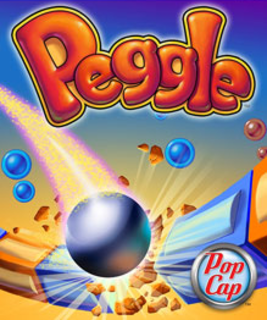As a game and an experience, Peggle succeeds tremendously in what it set out to achieve.
Pompous and terrible though I may be, the purpose of this review isn't to character assassinate myself, but to remind the 'hardcore' gamer in us all to get off that high horse every now and then and have fun. Peggle epitomises that sentiment because of its simplicity: your goal is to clear all the red pegs from the board by hitting them with a pinball fired from the top of the screen. Scattered amongst them are blue pegs (non-essential to clear the level but score you extra points) and various environmental objects the pinball can bounce off of. There's also a bucket at the bottom of the screen that moves from side-to-side; you'll get bonus points and an extra turn if the pinball lands in it.
As the ball pings around from top-to-bottom, the sheer unpredictability of it all will enthral you. Are you going to get the red peg, the bucket bonus... these seemingly trivial things will have you in ecstasy when they do and despair when they don't. And to make it even more effective, it plays on sensory reception to enhance the effect. Pegs that get hit emit a mystical glow to signify as such, before being cleared from the board on your next turn. Not only that, but each hit elicits a chiming sound effect that increases in pitch for every peg in that turn. That doesn't sound particularly exciting when you're sat there reading about it, but it all contributes to that sense of child-like glee that Peggle is so good at creating.
Part of the appeal when you're playing competitively (local or online) is the fact that everyone is reduced to ground-zero. The twitch reactions accumulated from hours of Modern Warfare 2 or the perfection of multi-hit combos in Street Fighter won't help you. All you need is to line up your shot with the analogue stick and hit the button to fire the ball; your mother (and grandmother probably) would have no problem with it. It plays out a little differently than a solo game: instead of clearing all the red pegs you compete with each other on score. But you still have to hit a red peg each turn or you take a 25% reduction to your accumulated score. This will inevitably lead to some checkmate situations that make it nigh-on impossible to hit a red, and occasionally, odds-defying shots that will have you jumping for joy (and quite possibly exchanging some friendly banter with your opponent).
Simplicity is the name of this game, but there is a (small) layer of strategy when it comes to selecting your character. Each of the ten characters (the latter eight of which are unlocked in the single-player game) has a specific power triggered by hitting a green peg. Some of them activate immediately and others remain activated for a few turns, but there aren't any game-breakers and the effects are quite diverse. Mayhem inevitably follows the activation of multi-ball (which grants you one extra ball for that turn), and the flippers that last for three turns make it feel more like conventional pinball. Other powers are less flamboyant but equally useful; super-guide shows you the trajectory the ball will take after hitting a peg, whilst the Zen-ball has the AI hijack your shot and make what should mathematically be the best shot for score accumulation.
Great as the core game-play might be, Peggle offers up a nice selection of modes to keep things fresh. The single-player mode walks you through the basics and explains how to use each character's power, or you can play in free mode against the computer to practise (although there are far more exciting ways to play). The real attraction, besides online (for up to four) and local (for two) multi-player, is challenge mode. The only true deviation from Peggle's cater-to-everyone approach, it tasks you with clearing maps with special conditions. These include clearing the board of all pegs, beating the computer set to master difficulty, and even clearing a board starting with a single ball! Some of these will have you tearing your hair out if you commit yourself to beating them, but rest assured they are completely optional.
As a game and an experience, Peggle succeeds tremendously in what it set out to achieve. You might say, by that measure, it's perfect. Obviously nothing is perfect in the truest sense of the word, but you really have to pick at stuff. For the sake of balance I'll have a go. The range of boards could be greater; there are quite a lot, but the games are pretty short, and if you spend a while on a multi-player session, you might find yourselves repeating boards. To that end, a board editor would have been fantastic. And a quick reset button wouldn't have gone amiss in challenge mode and the latter stages of single player. Beyond that, I've got nothing.
And on that note, I stand by my earlier statement that the core of what Peggle sets out to achieve is perfect. It's accessible to the masses, and coated with artificial-sunlight visuals and day-dreamy sounds that will amuse the young ones and charm the oldies. At 800 Microsoft Points it's a bargain that should be on everyone's hard drive: show the hardcore gamer within you what s/he's missing out on!

